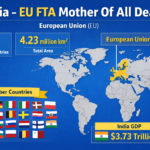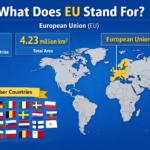At $83.57 billion, FDI inflow in FY22: Basics Explained

India attracted total foreign direct investments (FDI) inflow of $83.57 billion in the financial year 2021-22, up by 1.95 percent on the year (2020-21, the inflows were $81.97 billion ), according to data released by the Department for Promotion of Industry and Internal Trade (DPIIT). Total FDI includes equity capital of unincorporated bodies, reinvest earnings, and other capital.
Singapore is the top investing country followed by the US and Mauritius.
Karnataka is the top recipient state followed by Maharashtra and Delhi.
LEARNING FROM HOME/ WITHOUT CLASSES/ BASICS
Foreign direct investment (FDI) is an investment from a party in one country into a business or corporation in another country with the intention of establishing a lasting interest. Lasting interest differentiates FDI from foreign portfolio investments, where investors passively hold securities from a foreign country. A foreign direct investment can be made by obtaining a lasting interest or by expanding one’s business into a foreign country.
As FDI Inflow is a macroeconomic variable, it is represented in the balance sheet of the country known as Balance of Payments (BOP). The Foreign Direct Investment (FDI) inflows are reported under the capital account of BOP.
Foreign portfolio investment (FPI) consists of securities and other financial assets held by investors in another country. It does not provide the investor with direct ownership of a company’s assets and is relatively liquid depending on the volatility of the market. FPI holdings can include stocks, ADRs, GDRs, bonds, mutual funds, and exchange-traded funds, done with the expectation of earning a return.
Along with foreign direct investment (FDI), FPI is one of the common ways to invest in an overseas economy. FDI and FPI are both important sources of funding for most economies. Unlike FDI, FPI consists of passive ownership; investors have no control over ventures or direct ownership of property or a stake in a company.
On a more macro level, foreign portfolio investment is part of a country’s capital account and is shown on its balance of payments (BOP). The BOP measures the amount of money flowing from one country to another country over one monetary year.
| Foreign Direct Investment (FDI) | Foreign portfolio investment (FPI) |
| An investment made by a firm or individual in one country into business interests located in another country. | Refers to investments made in securities and other financial assets issued in another country. |
| Directly investing in the productive assets of another nation. | Investing in financial assets like the bonds and stocks of another country. |
| Active investors as they are involved in the day-to-day functioning and operation as well as strategic planning required by any domestic companies. | Passive investors as are not involved in the day-to-day functioning |
| FDI investments are carried out with a longer horizon in mind as investors usually do not liquidate their assets and depart from the nation so is less volatile | FPI assets are both widely traded and highly liquid so is volatile. |




0 Comments